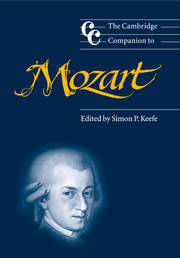Introduction
Published online by Cambridge University Press: 28 September 2011
Summary
Friedrich Kerst, assessing the significance of Mozart early in the twentieth century, introduces Mozart: The Man and the Artist Revealed in His Own Words in unashamedly hagiographical fashion:
Mozart! What a radiance streams from his name! Bright and pure as the light of the sun, Mozart's music greets us. We pronounce his name and behold! The youthful artist is before us – the merry, light-hearted smile upon his features, which belongs only to true and naïve genius.
Packing his prose with overworked generalizations about Mozart and his music – brightness and purity, eternal youthfulness, blissful ignorance aligned with genius – Kerst is one of countless late eighteenth-, nineteenth-and twentieth-century writers to worship at Mozart's shrine. In the last fifty years in particular, Mozart scholars have attempted either directly or indirectly to negate such stereotypes and the laudatory tone that accompanies them. Thanks to pioneering archival work on written and musical sources, and on late eighteenth-century aesthetic and theoretical trends manifest in his music, scholars are now in a better position than ever to evaluate both Mozart's impact on his contemporaries and successors, and his continuing relevance to an ever-changing musical world.
While unadulterated hyperbole about Mozart is a distant memory in scholarly circles, it flourishes as never before outside the academy. The bicentennial celebrations in 1991 outstripped in scope and worldwide participation all preceding and succeeding celebrations of a composer's work; the critical and commercial success of the cinematic version of Amadeus (1984) demonstrated the extraordinary public fascination with Mozart and his life story; and predictable millennial polls, aimed at identifying the greatest composers of all time, put Mozart close to the top, even in the company of twentieth-century pop artists who were always likely to garner the popular vote.
- Type
- Chapter
- Information
- The Cambridge Companion to Mozart , pp. 1 - 4Publisher: Cambridge University PressPrint publication year: 2003



